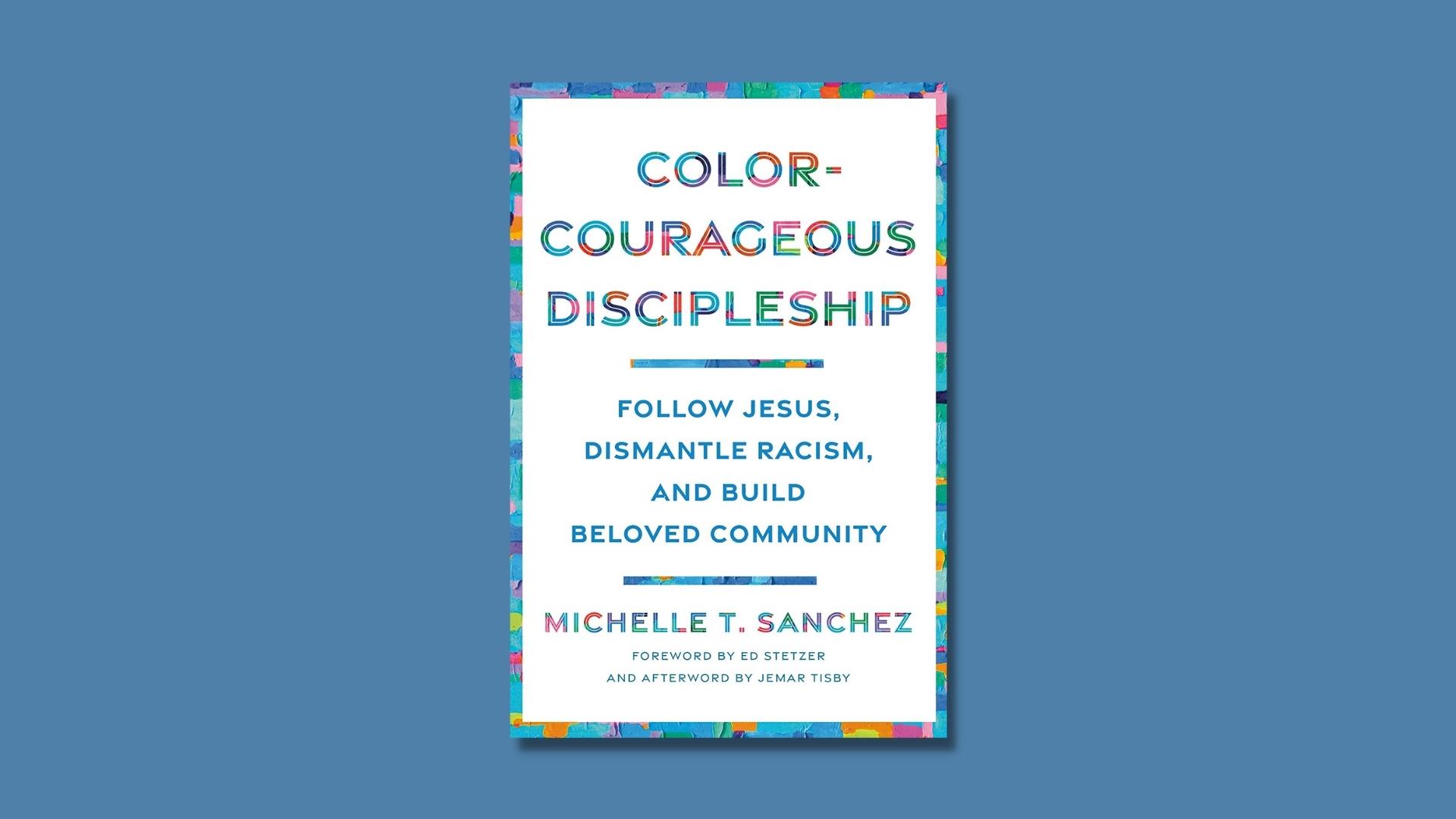Color-Courageous Discipleship: Follow Jesus, Dismantle Racism, and Build Beloved Community
By Michelle T. Sanchez
Waterbrook, 304 pages
What is this “antiracism” thing I keep hearing about? Are you saying I’m a racist if I’m not antiracist? How am I culpable for what somebody else did? Is antiracism biblical? Is all this focus on race a secular agenda hijacking the gospel? Is it biblical? How do antiracism and discipleship fit together? I feel lost and overwhelmed with what I’ve learned about racism, what do I do now?
These are real questions people have asked me. They deserve real engagement, and I seek to engage them in a manner that is clear, understandable, and rooted in Scripture. As a white male who is deeply committed to town and county ministry, I have served churches in settings that are overwhelmingly white majority. I have only begun my own journey in exploring race in the context of discipleship in the last few years—I’m definitely not an expert. So why am I reviewing this book?
In Color-Courageous Discipleship, Michelle Sanchez, executive minister of Make and Deepen Disciples, puts herself out there. It’s painful to read that as a child she was called “an Oreo” and didn’t feel like she fit in with either Black or white culture. She demonstrates that discipleship around race is not for the faint-hearted. It requires courage. Courage to ask questions that may seem stupid. Courage to feel awkward. Courage to know you will probably offend someone unintentionally. Courage to admit that there are things you don’t know that you don’t know. And courage requires vulnerability.
I am still early in this journey around race and discipleship, and I have often found it to be overwhelming. Until now I had not found an accessible book that was rich in depth on race, with a sound biblical and theological underpinning for practical discipleship. I wondered if I was just ignorant of the literature, but Sanchez confirmed my frustration: “Why this book when so many others have been written? As a discipleship practitioner, I have also been enriched by reams of excellent books on discipleship. I have also read many enlightening books on race. My intention is for this book is to take us on a deeper dive into the many life-transforming connections between the two.”
Color-Courageous Discipleship provides clear data showing the effects of systemic racism in the U.S., without overloading the reader, and offers an excellent theological treatment along with specific actions of discipleship. Summing it up, she tells us, “My project has been to freshly connect antiracism principles to the fundamental principles and dynamics of Christian discipleship.” She notes that we all have already been discipled concerning race—what is needed is re-discipling. Sanchez helps us do this in the book’s three parts.
The first section provides an “invitation to pursue a racial discipleship journey grounded in Christ.” “Grounded in Christ” is at the heart of this journey, because “racism is, at its core, a spiritual problem”; therefore, it requires a spiritual solution. I find it helpful, refreshing, and hopeful that this spiritual problem, requiring a spiritual solution, is linked specifically to spiritual practices. Without spiritual practices we are left to pursue this arduous journey on our own strength.
Part 2 fleshes out four paradigm shifts of discipleship: awakening (opening our eyes to the reality of inequality); wardrobe change (taking off our biases holding us back); healing (being healed before we are agents of healing); and the creation of beloved community (experiencing Christ-shaped solidarity).
Part 3 is about specific spiritual disciplines. We get “a look at uncommon ways of practicing four spiritual disciplines that commonly occur in Scripture.” Reading Scripture, praying (with an emphasis on lament), pilgrimage, and fasting are all addressed. Although evangelicals place a strong emphasis on reading Scripture, we don’t often ask what cultural assumptions we bring to the text, and we often don’t realize the effect our cultural norm of individualism has on how we read Scripture. And many people question why they should repent for something they personally didn’t do. In response, Sanchez notes that regardless of one’s direct culpability “at minimum, today’s disciples can express remorse for unjust actions taken in the past that continue to impact the present. From this perspective, it may also help to remember that repent means ‘to pivot.’ Repentance is most essentially about intentionally choosing to go in a different direction.”
Color-Courageous Discipleship offers clear definitions of key words and concepts that are often charged and frequently misunderstood (with a succinct user-friendly glossary at the end of the book). Sanchez explains that being antiracist is “about making the needful move from passive to proactive in our resistance of racism” and antiracism is “becoming aware of and uprooting personal prejudice and bias plus working to dismantle systemic practices that lead to racial inequalities in society.” Compelling personal stories, short interviews of other fellow pilgrims of color-courageous discipleship, suggestions for further reading, and discussion questions all help create a book that is rich in resources and accessibility.
In my experience of pastoral ministry, we have a critical need for frank but inviting explorations of power dynamics. Sanchez poignantly states, “Brothers and sisters, if there is only one next step you take after reading this book, please make it a power audit—the ongoing practice of identifying the power that you hold.”
I’ve often encountered white people who are concerned about the ongoing horror of systemic racism, who are asking, “What do I do now?” Sanchez shows us a picture of what transformation into a disciple of Jesus who is color courageous looks like and how spiritual practices can shape us in this journey.
I recommend this book to all who are new to this conversation. Sanchez is particularly clear that the journey of antiracist discipleship is for everyone, and I recommend this book for all. I especially recommend it to anyone who wants to engage in the journey but needs a guide to help them to step out in vulnerability and examine their own privilege and power. I pray that members of the body of Christ receive this gift, in its fullness, by joining in the pilgrimage of becoming increasingly color-courageous disciples.














